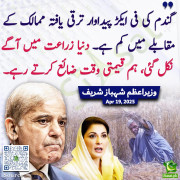You are using an out of date browser. It may not display this or other websites correctly.
You should upgrade or use an alternative browser.
You should upgrade or use an alternative browser.
Ruling on beating one's wife in Islam
- Thread starter Wake up Pak
- Start date
jigrot
Minister (2k+ posts)
The Quran's guidance on marital conflict, including the mention of "striking," is a last resort in resolving a situation of serious disobedience, not a directive for regular behavior. It’s about correcting, not punishing. The emphasis is on respect, kindness, and resolving conflict peacefully—the physical aspect should be symbolic and non-harmful, aligning with the Prophet's teachings of compassion.Why did he use lightly in bracket?
Yusuf Ali: Men are the protectors and maintainers of women, because Allah has given the one more (strength) than the other, and because they support them from their means. Therefore the righteous women are devoutly obedient, and guard in (the husband's) absence what Allah would have them guard. As to those women on whose part ye fear disloyalty and ill-conduct, admonish them (first), (Next), refuse to share their beds, (And last) beat them (lightly); but if they return to obedience, seek not against them Means (of annoyance): For Allah is Most High, great (above you all).
jigrot
Minister (2k+ posts)
The Quran's guidance on marital conflict, including the mention of "striking," is a last resort in resolving a situation of serious disobedience, not a directive for regular behavior. It’s about correcting, not punishing. The emphasis is on respect, kindness, and resolving conflict peacefully—the physical aspect should be symbolic and non-harmful, aligning with the Prophet's teachings of compassion.What I've mentioned is all from so called Sahih Hadith. Not from any mullah.
jigrot
Minister (2k+ posts)
The topic of marital relations, including the issue of discipline in marriage, is addressed in the Quran, particularly in Surah An-Nisa (4:34). The verse often referenced in this context is:Why did he use lightly in bracket?
Yusuf Ali: Men are the protectors and maintainers of women, because Allah has given the one more (strength) than the other, and because they support them from their means. Therefore the righteous women are devoutly obedient, and guard in (the husband's) absence what Allah would have them guard. As to those women on whose part ye fear disloyalty and ill-conduct, admonish them (first), (Next), refuse to share their beds, (And last) beat them (lightly); but if they return to obedience, seek not against them Means (of annoyance): For Allah is Most High, great (above you all).
Surah An-Nisa (4:34):"Men are the protectors and maintainers of women because Allah has made one of them to excel the other, and because they spend of their wealth (for the support of women). So good women are the obedient, guarding in the husband’s absence what Allah would have them guard. As for those from whom you fear disobedience, admonish them and refuse to share their beds, and (as a last resort) strike them. But if they return to obedience, seek not against them any means. Surely, Allah is Ever Most High, Most Great."
This verse has been widely discussed, and different interpretations have been offered. Here's a summary of the key points:
1.
- Role of Men as Protectors: The verse emphasizes that men have a responsibility as protectors and providers for their wives.
- Stages of Resolving Conflict: The verse provides a three-step approach to resolve conflict when there is marital disobedience (which is understood as a breach of rights):
- Admonition: Gently advising and counseling the wife.
- Separation in Bed: If the issue persists, refraining from sharing a bed to signify emotional distancing.
- Physical Correction: The term "strike" (Arabic: "idribuhunna") is the most controversial part of this verse. However, Islamic scholars emphasize that this "strike" is not intended to cause harm. Many scholars clarify that it should be symbolic, non-abusive, and used only as a last resort in cases of serious marital discord, not as a general form of discipline.
2.
- Not Abuse: The word "strike" is often interpreted as a symbolic act of discipline, and it is prohibited to cause harm or injury. In fact, the Prophet Muhammad (PBUH) himself never struck his wives and discouraged any form of harm or abuse in marriage.
- Limits: The context of this verse is important. It’s not a permission for physical abuse but rather a framework for trying to resolve conflicts in a marriage. The Prophet Muhammad (PBUH) made it clear in his teachings and hadiths that kindness, mutual respect, and compassion should define marital relations.
- Prophet Muhammad’s Example: The Prophet Muhammad (PBUH) is reported to have said, "The best of you are those who are the best to their wives." (Sunan al-Tirmidhi). He also emphasized treating women with honor and kindness in his final sermon.
3.
- Islamic Teachings on Kindness: Islam strongly advocates for treating women with kindness and respect. In fact, abuse and cruelty are strictly condemned. The Quran says: "And live with them in kindness" (Quran 4:19).
- Prophetic Hadiths: The Prophet Muhammad (PBUH) is reported to have said, "Do not strike the face of your wife, and do not call her bad names." (Sunan Abu Dawood).
4.
- Modern Interpretations: Most contemporary scholars stress that Islam does not condone physical abuse in marriage. They advocate for peaceful conflict resolution and a healthy, respectful relationship based on mutual love and understanding.
- Rights of Women: Islamic law grants women rights to protection, respect, and honor, and it is emphasized that violence is against the spirit of Islam.
Conclusion:
The Quranic verse has been historically misinterpreted in some cases, and it is essential to approach this matter with a nuanced understanding. Islam advocates for the protection and well-being of women, and any action that leads to harm or abuse goes against the core principles of the religion.
jigrot
Minister (2k+ posts)
The topic of marital relations, including the issue of discipline in marriage, is addressed in the Quran, particularly in Surah An-Nisa (4:34). The verse often referenced in this context is:What I've mentioned is all from so called Sahih Hadith. Not from any mullah.
Surah An-Nisa (4:34):"Men are the protectors and maintainers of women because Allah has made one of them to excel the other, and because they spend of their wealth (for the support of women). So good women are the obedient, guarding in the husband’s absence what Allah would have them guard. As for those from whom you fear disobedience, admonish them and refuse to share their beds, and (as a last resort) strike them. But if they return to obedience, seek not against them any means. Surely, Allah is Ever Most High, Most Great."
This verse has been widely discussed, and different interpretations have been offered. Here's a summary of the key points:
1.
- Role of Men as Protectors: The verse emphasizes that men have a responsibility as protectors and providers for their wives.
- Stages of Resolving Conflict: The verse provides a three-step approach to resolve conflict when there is marital disobedience (which is understood as a breach of rights):
- Admonition: Gently advising and counseling the wife.
- Separation in Bed: If the issue persists, refraining from sharing a bed to signify emotional distancing.
- Physical Correction: The term "strike" (Arabic: "idribuhunna") is the most controversial part of this verse. However, Islamic scholars emphasize that this "strike" is not intended to cause harm. Many scholars clarify that it should be symbolic, non-abusive, and used only as a last resort in cases of serious marital discord, not as a general form of discipline.
2.
- Not Abuse: The word "strike" is often interpreted as a symbolic act of discipline, and it is prohibited to cause harm or injury. In fact, the Prophet Muhammad (PBUH) himself never struck his wives and discouraged any form of harm or abuse in marriage.
- Limits: The context of this verse is important. It’s not a permission for physical abuse but rather a framework for trying to resolve conflicts in a marriage. The Prophet Muhammad (PBUH) made it clear in his teachings and hadiths that kindness, mutual respect, and compassion should define marital relations.
- Prophet Muhammad’s Example: The Prophet Muhammad (PBUH) is reported to have said, "The best of you are those who are the best to their wives." (Sunan al-Tirmidhi). He also emphasized treating women with honor and kindness in his final sermon.
3.
- Islamic Teachings on Kindness: Islam strongly advocates for treating women with kindness and respect. In fact, abuse and cruelty are strictly condemned. The Quran says: "And live with them in kindness" (Quran 4:19).
- Prophetic Hadiths: The Prophet Muhammad (PBUH) is reported to have said, "Do not strike the face of your wife, and do not call her bad names." (Sunan Abu Dawood).
4.
- Modern Interpretations: Most contemporary scholars stress that Islam does not condone physical abuse in marriage. They advocate for peaceful conflict resolution and a healthy, respectful relationship based on mutual love and understanding.
- Rights of Women: Islamic law grants women rights to protection, respect, and honor, and it is emphasized that violence is against the spirit of Islam.
Conclusion:
The Quranic verse has been historically misinterpreted in some cases, and it is essential to approach this matter with a nuanced understanding. Islam advocates for the protection and well-being of women, and any action that leads to harm or abuse goes against the core principles of the religion.
jigrot
Minister (2k+ posts)
Yes, Islam, as the Quran teaches, is not a confined belief system but a universal way of life meant for all of mankind. It provides guidance on how to live harmoniously, ethically, and spiritually—regardless of one’s background. For those who accept its message, it is a path of light and guidance; for others, the guidance is still there, awaiting their choice.By the way, Islam is not a religion but a way of life. That is why the Quran clearly says that this Book is for mankind, not for Muslims or Mominoon.
“A Book We have sent down to you so that you may bring forth mankind from the darkness into the light...” [14:1]
“.. a guidance for mankind and clear evidence of guidance and discrimination (between wrong)”. [2:185]
39:41
Sahih International: Indeed, We sent down to you the Book for the people in truth. So whoever is guided - it is for [the benefit of] his soul; and whoever goes astray only goes astray to its detriment. And you are not a manager over them.
O Mankind! Worship your Lord, Who created you and those who were before you, that you may ward off evil.2:21
Wake up Pak
(50k+ posts) بابائے فورم
Where did the so-called scholars get the notion that "strike" is not intended to cause harm? Did Allah forget to mention it?Physical Correction: The term "strike" (Arabic: "idribuhunna") is the most controversial part of this verse. However, Islamic scholars emphasize that this "strike" is not intended to cause harm. Many scholars clarify that it should be symbolic, non-abusive, and used only as a last resort in cases of serious marital discord, not as a general form of discipline.
And what is the punishment if the husband misbehave with his wife?
Therefore we need to understand that the word Rijal does not necessary mean men and the Nisa does not necessary mean women. I have posted a video above that will explain the structure and the meaning of the words and the verse itself.
Also, i do not condone to any Ahadith or Sunnah. To me the Quran alone is enough, and the Quran has emphasized on several places that IT is detailed and complete.
Citizen X
(50k+ posts) بابائے فورم
Problem is no one takes guidance from the Quran but rather hadith which they claim explains the Quran. So 99.9% of Islam being you see being practiced today is from the hadith and not from the QuranThe Quran's guidance on marital conflict, including the mention of "striking," is a last resort in resolving a situation of serious disobedience, not a directive for regular behavior. It’s about correcting, not punishing. The emphasis is on respect, kindness, and resolving conflict peacefully—the physical aspect should be symbolic and non-harmful, aligning with the Prophet's teachings of compassion.
© Copyrights 2008 - 2025 Siasat.pk - All Rights Reserved. Privacy Policy | Disclaimer|

































